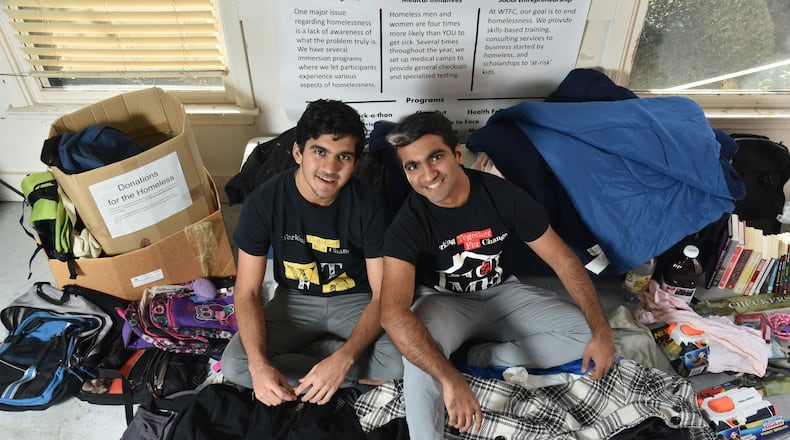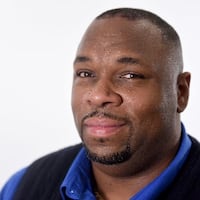When Nitish Sood and his brother Aditya founded Working Together for Change in 2013, they were hoping to create a space for dialogue about homelessness while addressing needs of the homeless population around metro Atlanta.
They also were teenagers without driver’s licenses who felt discouraged after trying to give back through other groups.
“We’re really a student platform to get involved,” said Nitish, now 18 and a student at Augusta University. “A lot (of volunteer organizations) were geared toward adults. That made sense for safety and liability, but there were tons of students who wanted to get involved. That was the demographic that wasn’t at the table.”
The age of new entrepreneurs has skewed younger and younger, thanks to the advent of social media and a want by the country’s younger generation to provide products and services — or opportunities — when and where they see a need.
Nitish Sood was recently honored with the Gloria Barron Prize for Young Heroes, which honors 25 young people across the country who have made a significant impact on people or the environment.
“Kids are tired of waiting for grown-ups to tackle things,” said Barbara Ann Richman, executive director for the Gloria Barron Prize for Young Heroes organization. “What’s new is they’ve realized it takes a community to do the work. The heroism has been a thing, but the kids seem to be bolder, more confident and they realize —and they say this — that we can’t expect the people in charge to address.
“At a small grassroots level, they see they can have some sort of impact.”
Most businesses and nonprofits started by young entrepreneurs are rooted in issues in their respective communities or problems they experience personally, said Monica Lage, executive director for Break Into Business, an Atlanta company that coaches young people who start businesses.
"They want to solve real problems," she said. "They don't want it to be theoretical."
She said they encourage young entrepreneurs to find businesses connected to their passions.
“We find if they’re passionate about it, they stick with it,” she said. “This generation is so wired, it’s in their DNA. Everything they do, they’re wondering: ‘How is it connected to the impact I want to have?’ ”
Amy Webb, who forecasts digital trends for nonprofit and for-profit companies, said, "I think to a millennial, who's grown up in a very different world, one that's more participatory because of the digital tools that we have, to them they want to feel like they're making an investment. Not just that they're investing their capital, but they're investing emotionally."
“Today’s millennial generation is dedicated to donating time and money as a powerful force for good on global issues,” said Kathy Calvin, President and CEO of the United Nations Foundation.
A study that foundation sponsored in 2013 by the Women's Philanthropy Institute at Indiana University Lilly Family School of Philanthropy found nearly 9 out of 10 American youths between ages eight and 19 give money to charitable causes, and more than half of also volunteered for a nonprofit or community organization.
The Sood brothers said a bad Frisbee toss that landed near a homeless woman at an Atlanta-area mall sparked a conversation where the woman divulged she was a trained medical doctor, complete with a degree.
“We were pretty stunned,” said Aditya, now 20 and a student at the University of Georgia. “If someone with a medical degree can end up on the streets, how many steps are any of us away?”
That conversation, they said, began Working Together for Change. The group has grown from idea to 100-person volunteer field, with chapters in Fulton County, at the Sood brothers’ colleges, in Macon and California. They have passed out hundreds of backpacks filled with clothing, books, deodorant and soap and put on medical camps offering health and wellness counseling and testing for things such as blood pressure and cholesterol. They have also awarded scholarships to homeless students.
“We want to end homeless one person at a time,” Nitish Sood said. “Through finding unique solutions to help one person at a time.”
Sixteen-year-old Remington Youngblood from Lambert High School in Forsyth County also was recognized this year by the Barron Prize group for his contributions to society at large through his nonprofit, Change4Georgia, which benefits active-duty and veteran military personnel. Youngblood said Change4Georgia has raised about $3 million since it was started in 2011 to provide care packages to overseas troops, as well as scholarships for veterans.
He said he started his organization after being turned away by other groups when he was trying to get involved in community service. About 300 other teens volunteer through the group.
“When I moved here, I was looking for community service opportunities to participate in and called 15 places. Every single one of them turned me down,” Remington said. “I was too young. I was a liability. But I didn’t want to give up there.”
He said the organization has given him a greater appreciation for giving back, mostly by being able to interact directly with those who receive the support.
“There’s a large difference for me personally in helping out organizations,” he said. “You know you’re doing a good thing, but you have no idea who you’re actually impacting. You’re just sending off the money. With Change4Georgia, I get to experience firsthand how people are living.
“It’s a different feeling of accomplishment when I get to experience it firsthand.”
About the Author
Keep Reading
The Latest
Featured



